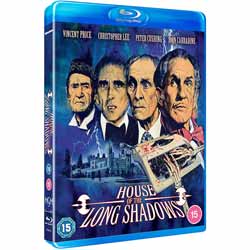|
Click here to return to the main site. Blu-ray Review
A young American novelist is in England to promote his latest book. At the launch, his publisher challenges him to write a bestselling novel in twenty-four hours. A long-abandoned mansion house deep in the countryside is recommended to create the appropriate atmosphere to write a spooky tale. No sooner has he taken position in front of his typewriter in an upstairs room than he becomes aware of a presence in the house. A strict elderly couple purport to be the caretakers, and furthermore they are expecting guests. One by one, three spine-chilling, menacing and somewhat daunting figures arrive. Immediately, their imposing characters clash. But is there more going on than meets the eye? All but one appear to know each other, and the other is not what he seems. But just who or what has been sealed behind a heavily locked door for decades...? This fun horror flick from 1983, helmed by horror/exploitation director Pete Walker, is based on the Earl Derr Biggers 1913 novel Seven Keys to Baldpate. The film is doubtless much better known for its prestigious cast than the script – although it can be said that all of the actors are given opportunity to shine, and the plot seems to motor along to its major twist of a conclusion. The film company wanted to go all-out by securing the screen talents of Boris Karloff and Bela Lugosi. When Walker pointed out they were dead, interest moved to the next era: namely that of Hammer and Amicus Films. It’s a momentous occasion, as this is the first and last time we get to enjoy the magnificent splendour of four icons of horror on the same bill. Peter Cushing and Christopher Lee had already worked together on many films and were close friends. Vincent Price and John Carradine had likewise worked together. The consensus of opinion is they all got on like a house on fire – even though they were all very different people, and there was some tongue-in-cheek one-upmanship behind the scenes. It’s probably not giving too much away after this amount of years to reveal that the main characters make-up the Grisbane family, the original owners of the house. Cushing, described by the whole crew as a lovely man and a kind soul, plays Sebastian with a speech impediment to enhance the character’s nervous quality. Price, who put everyone at their ease, and was considered to be a very intelligent and knowledgeable man, plays his brother Lionel, a very grand and articulate character – the centre of attention, you might say. Carradine was said to be elderly and not entirely well at the time. During a panning shot he was seen to be asleep, but as the camera reached him he lifted his head and spoke his lines with suitable aplomb. I consider his performance to be very fine, playing the father Lord Grisbane with a quiet authority. Lee was always a dark and imposing figure; like Roger Delgado, he produced chills just by looking at him. He obviously played on this a great deal but, nevertheless, was a formal gentleman from a bygone age. Here he plays the manor’s new owner Corrigan (and something else) with a certain impatience and irritability. It’s easy to see why when the audience discovers more about the character. Another big name to grace the cast is Richard Todd, who plays the jovial publisher Sam Allyson. Sheila Keith, who plays Victoria Grisbane the mother, was well-known to Pete Walker, having been cast in the roles of various bizarre and sadistic characters in a handful of his previous films – including House of Whipcord, Frightmare, and House of Mortal Sin. Her turn on the piano in this one is priceless – being one-third beautiful, two-thirds hilarious. Perhaps more known to American audiences was Desi Arnaz – from I Love Lucy, with ex-wife Lucille Ball. Here he is pretty solid as Kenneth Magee the writer. Considering he is the key character, it’s curious he seems to take most weird situations in his stride – particularly bearing in mind the denouement. In particular, Vincent Price - convincing in every portrayal I’ve seen – is given some wonderfully extravagant lines. It’s as if the scriptwriter was pushing to find his limits, only to discover the great man didn’t have any when it came to acting ability. The director once did the film a huge injustice by describing House of the Long Shadows as “… not as bad as I thought.” If you take the film in the intended spirit – grandiose, fun, and quirky – it’s extremely rewarding. And let’s not forget this is a piece of history. Extras include an Audio Commentary by Pete Walker and Derek Pykett; Pete Walker’s House of Horror; House of the Long Shadows…Revisited (an in-depth return to the location with extensive interviews); Photo Gallery, Trailer; and a Double-Sided Poster of the New Graham Humphreys Artwork. 9 Ty Power Buy this item online
|
|---|

